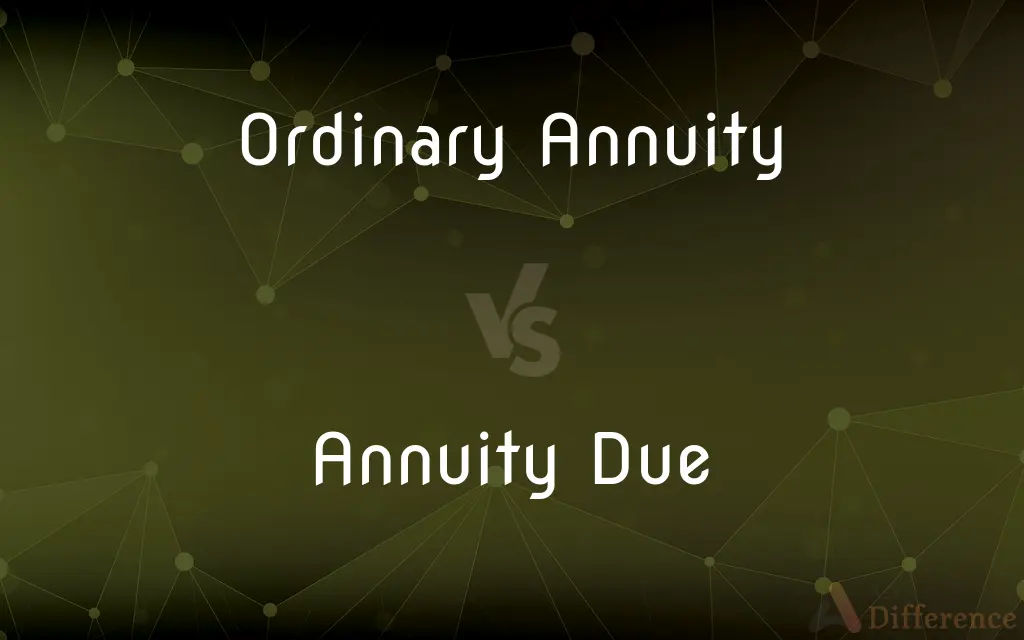Ordinary Annuity vs. Annuity Due — What's the Difference?
By Tayyaba Rehman — Published on October 25, 2023
Ordinary Annuity are payments made at period ends. Annuity Due are payments made at period starts.

Difference Between Ordinary Annuity and Annuity Due
Table of Contents
ADVERTISEMENT
Key Differences
Ordinary Annuity and Annuity Due are financial instruments, both providing a series of equal payments at equal intervals. Ordinary Annuity means that payments are made at the end of each period, while Annuity Due means payments are made at the beginning.
Comparing Ordinary Annuity and Annuity Due, the former emphasizes deferment of payments until period end, affecting the value of the annuity due to the time value of money. Annuity Due, on the other hand, capitalizes on immediate payments, maximizing financial gain.
Examining the utility of Ordinary Annuity, it often serves as a suitable option for investors looking for long-term benefits without immediate financial implications. Conversely, Annuity Due generally is preferable for recipients desiring immediate cash flow.
Focusing on return investments, Ordinary Annuity recipients often wait longer for returns due to payment deferrals. Whereas, Annuity Due recipients experience quicker financial benefits, affecting investment and spending choices differently.
When observing retirement planning, an Ordinary Annuity could potentially offer a less immediate financial burden on the payer, while Annuity Due might assure the receiver consistent, immediate financial support upon agreement commencement.
ADVERTISEMENT
Comparison Chart
Payment Timing
End of each period
Beginning of each period
Interest Accumulation
Starts accumulating after the first payment
Begins accumulating immediately
Cash Flow Benefit
Delayed
Immediate
Present Value
Lesser due to deferred payments
Higher due to immediate payments
Future Value
Typically less than Annuity Due
Typically more than Ordinary Annuity
Compare with Definitions
Ordinary Annuity
A sequence of equal payments made at each period end.
His pension is an ordinary annuity, disbursed at the month's end.
Annuity Due
A series of equal payments at the beginning of each period.
The insurance premium, an annuity due, is payable at each term's start.
Ordinary Annuity
A consistent payment stream received or paid after each period.
Her retirement plan consists of an ordinary annuity, ensuring yearly funds.
Annuity Due
A payment structure offering immediate cash flows at intervals' start.
Lease payments are typically an annuity due, paid upfront monthly.
Ordinary Annuity
A financial product paid out in equal intervals at period ends.
The lottery winner chose an ordinary annuity for yearly payments.
Annuity Due
A mechanism where financial transactions occur at intervals’ beginning.
Salary, as an annuity due, is often paid at the month’s initial phase.
Ordinary Annuity
Invested funds dispersed equally over a predetermined period, at its end.
Investors often select an ordinary annuity to mitigate immediate financial impacts.
Annuity Due
A financial model where payments are made at period commencement.
Rent is often structured as an annuity due, paid at the month's start.
Ordinary Annuity
A periodic payment system scheduled at equal intervals' conclusion.
He set up an ordinary annuity to systematically receive rental payments.
Annuity Due
An investment receiving or making equal payments at period onset.
Her loan repayment was set as an annuity due, initiating immediate paybacks.
Common Curiosities
How does Annuity Due differ from Ordinary Annuity?
Annuity Due involves payments at the start of each period, unlike Ordinary Annuity.
When is interest accumulated in Ordinary Annuity?
Interest in Ordinary Annuity starts accumulating after the first payment.
What is an Ordinary Annuity?
An Ordinary Annuity involves payments made at the end of each period.
Which has a higher present value, Ordinary Annuity, or Annuity Due?
Annuity Due typically has a higher present value due to immediate payment.
Can Ordinary Annuity assist in deferred payment advantages?
Yes, Ordinary Annuity enables deferred payment benefits, easing immediate financial burdens.
How does the future value differ between Ordinary Annuity and Annuity Due?
Annuity Due generally holds a higher future value than Ordinary Annuity due to immediate interest accumulation.
How does Annuity Due impact cash flow?
Annuity Due provides immediate cash flow by initiating payments at period start.
Which annuity type might be preferable for a retiree seeking immediate income?
Annuity Due is preferable for those seeking immediate income.
Why might a business prefer an Annuity Due for lease agreements?
Businesses might prefer Annuity Due to ensure immediate funds, enhancing cash flow.
In what scenario might an Ordinary Annuity be more advantageous?
Ordinary Annuity might be advantageous in scenarios where deferred payment is beneficial.
How does payment timing in Ordinary Annuity affect its present and future values?
Payment at period end in Ordinary Annuity results in lower present and future values compared to Annuity Due, due to deferred interest accumulation.
Why might someone in financial distress prefer Annuity Due?
Annuity Due might be preferred for its immediate payment structure, providing prompt financial relief.
How do immediate payments of Annuity Due affect its future value?
Immediate payments in Annuity Due allow earlier interest accumulation, enhancing its future value.
Is Annuity Due more suitable for ensuring immediate financial support?
Yes, Annuity Due ensures immediate financial support due to upfront payments.
Can an Ordinary Annuity be converted to Annuity Due?
Yes, an Ordinary Annuity can be converted to Annuity Due, altering payment timings.
Share Your Discovery

Previous Comparison
Duloxetine vs. Fluoxetine
Next Comparison
Ganglion vs. SynapseAuthor Spotlight
Written by
Tayyaba RehmanTayyaba Rehman is a distinguished writer, currently serving as a primary contributor to askdifference.com. As a researcher in semantics and etymology, Tayyaba's passion for the complexity of languages and their distinctions has found a perfect home on the platform. Tayyaba delves into the intricacies of language, distinguishing between commonly confused words and phrases, thereby providing clarity for readers worldwide.














































